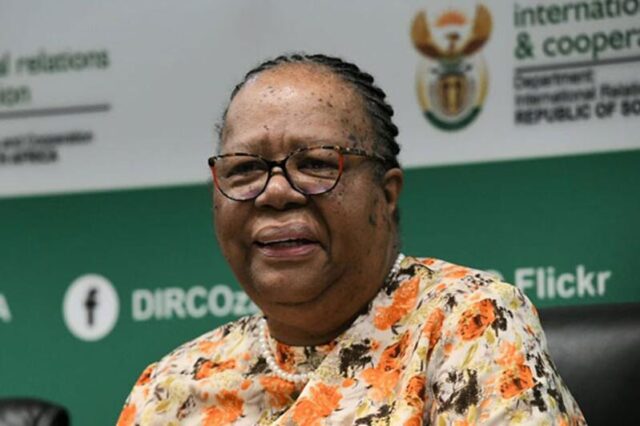The country was also open to playing a supportive role to regional states regarding mediation and conflict resolution, as well as the mediation and conflict resolution work led by the US, EU and Russia.
SOUTH Africa was open to exploring different avenues on where and how proposed mediation and conflict resolution in the Middle East would take place.
The country was also open to playing a supportive role to regional states regarding mediation and conflict resolution, as well as the mediation and conflict resolution work led by the US, EU and Russia.
“The mediation process could be held in South Africa, Israel, Palestine or in any country in the Middle East region,” said International Relations and Co-operation Minister Naledi Pandor.
In October, Pandor said in her executive statement in Parliament that South Africa was calling for an immediate ceasefire of hostilities in the Middle East.
At the time she had called for restraint and peace between Israel and Palestine, and extended an offer for South Africa to share its experience in mediation and conflict resolution.
Pandor’s executive statement prompted IFP MP Mkhuleko Hlengwa to enquire where and how the proposed mediation and conflict resolution would take place as South Africa did not have an ambassador in Israel and there has been no Israeli embassy in the country since 2018.
Parliament has since passed an amended motion calling on the government to close the Israeli embassy in South Africa and suspend all diplomatic relations with Israel.
President Cyril Ramaphosa said earlier this week that the government was considering the motion passed by Parliament a few weeks ago to cut all ties with Israel.
Pandor said there was political will and interest in South Africa in hosting a similar event to the one that took place in 2002 when South Africa had endeavoured to broker peace talks between Israel and Palestine under the Spier Presidential Peace Retreat.
“South Africa hosted two rounds of Spier talks in 2002, aimed at strengthening the peace camps on both sides, and looked to share South Africa’s negotiated transitional experiences.
This initiative demonstrated the spirit of commitment to dialogue and partnership for peace between the parties.”
Pandor said South Africa was also open to playing a supportive role to regional states Qatar and Egypt regarding mediation and conflict resolution, as well as mediation and conflict resolution work by the US, EU and Russia.
“South Africa has declared itself in favour of the deployment of an international monitoring force in the occupied Palestinian territories.”
The stance by the government on the Israel-Palestine conflict happens as it has referred Israeli Prime Minister Benjamin Netanyahu and his senior officials to the International Criminal Court (ICC) to be investigated for war crimes and crimes against humanity.
Hlengwa had asked whether the government also called for Hamas leaders to be investigated for war crimes and crimes against humanity.
According to Pandor, South Africa had joined other countries such as Bangladesh, Bolivia, Comoros and Djibouti that referred the situation in the State of Palestine to the Office of the Prosecutor (OTP) of the ICC.
“Although Israel is not a state party, the ICC has jurisdiction over crimes committed in the Palestinian territories by nationals of Israel. The ICC also has jurisdiction over crimes committed in Israel by nationals of the State of Palestine,” she said.
“Through this referral, South Africa has not called upon the OTP to investigate specific persons. Rather, it is a call upon the OTP to prioritise the Palestine situation and to vigorously investigate all crimes committed in the situation that fall within the jurisdiction of the ICC.”
Cape Times








